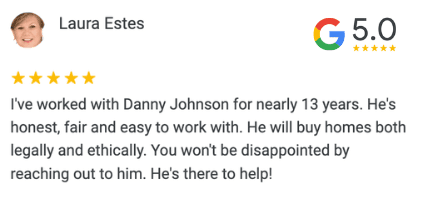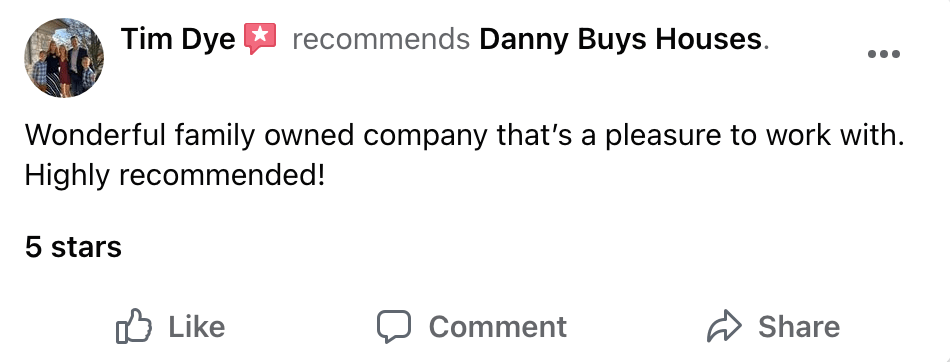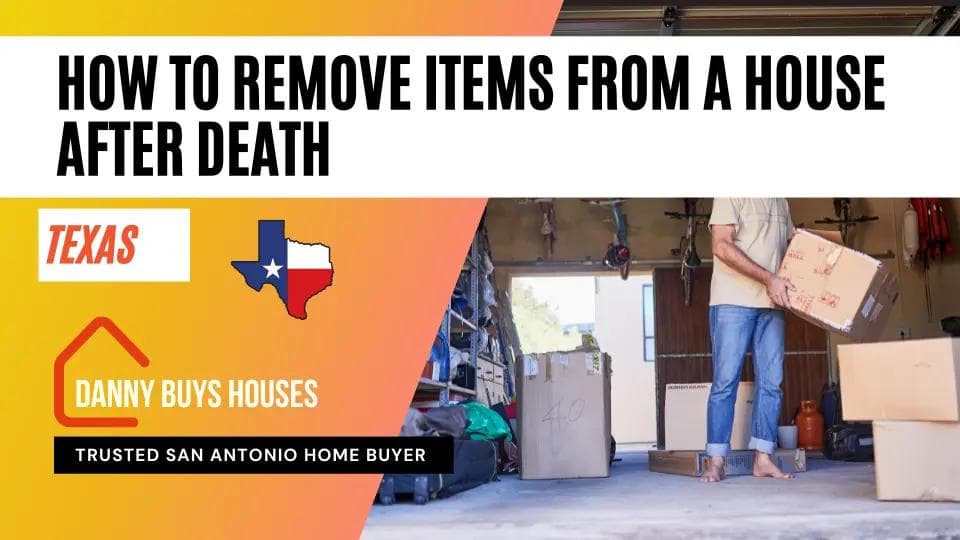
Overwhelmed? Here’s How to Easily Remove Items from a House After a Loved One's Death
By Danny Johnson | Updated 9/3/2024, 8:02:56 AM
Overwhelmed by the contents of a loved one’s house after their death? Discover how to easily remove items and empty a house before probate begins.
- Key Takeaways
- How to get rid of household items after a death? Here are your options
- Keep What You Need and Can Use
- Estate Sale
- Flow For Sorting When You Remove Items From the Estate
- Selling the House? Consider Selling With Everything You Don't Want
- Can you empty a house before probate?
- Understanding the Emotional Process of Clearing a Loved One's Home
- Recognizing the Challenges of Grief and Decluttering
- Taking Time to Process Emotions Before Starting
- Creating a Support System for the Task
- Removing Items from House After Death: A Step-by-Step Approach
- Step 1: Starting with Less Sentimental Areas
- Sorting Items into Categories
- Handling Sentimental Items with Care
- Seeking Professional Help for Valuables
- Leave Items There and Sell As Is to a Cash Home Buyer
- Conclusion
🗂 Table of Contents
Losing someone close is always difficult, and dealing with their things can feel like too much. Mark M. gets it. He told us, "I stood in my grandmother's kitchen, surrounded by memories, feeling lost. The idea of clearing out her house after she passed seemed too big to handle." You're not alone if you're facing this challenge.
In the U.S., we often shy away from talking about death. This makes the process harder when it happens. You may have never even considered what happens to property when an owner dies. Some families move everything to storage, unable to tackle the emotional clutter. But there are kinder and easier ways to handle this tough task. These methods respect your loved one's memory and help you move forward.
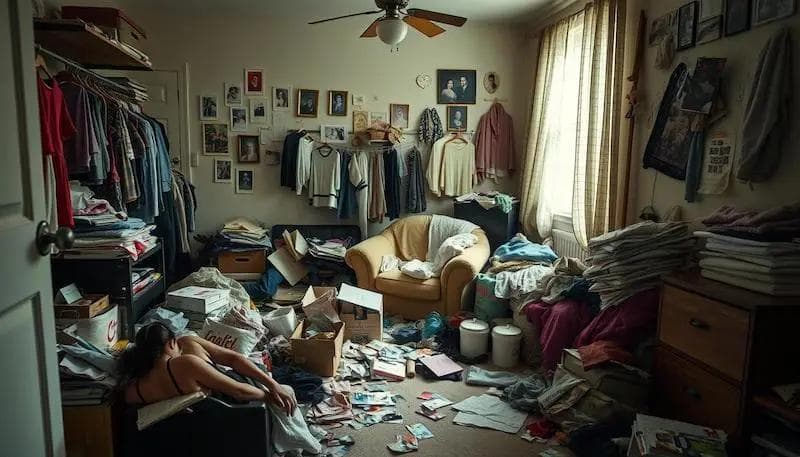
Handling an estate, the probate process, and sorting through belongings while grieving is a lot to bare. It's okay to go slow. Begin with areas like the bathroom or kitchen that hold fewer memories. This process is about healing and decluttering.
You as the executor of the estate have a lot on your plate.
When going through sentimental items, think about making a memory box or taking photos. This way, you keep memories without keeping everything. And don't be afraid to ask for help. Family or friends can offer great support during this hard time.
Key Takeaways
- Take your time and be patient with yourself
- Start with less emotionally charged areas of the house
- Create a system for sorting items (keep, donate, sell, discard)
- Consider making a memory box for sentimental items
- The executor shouldn't hesitate to ask for help from family and friends
- Remember that grief is a personal journey with no set timeline
- You can avoid the clean out by selling to a cash home buyer
How to get rid of household items after a death? Here are your options
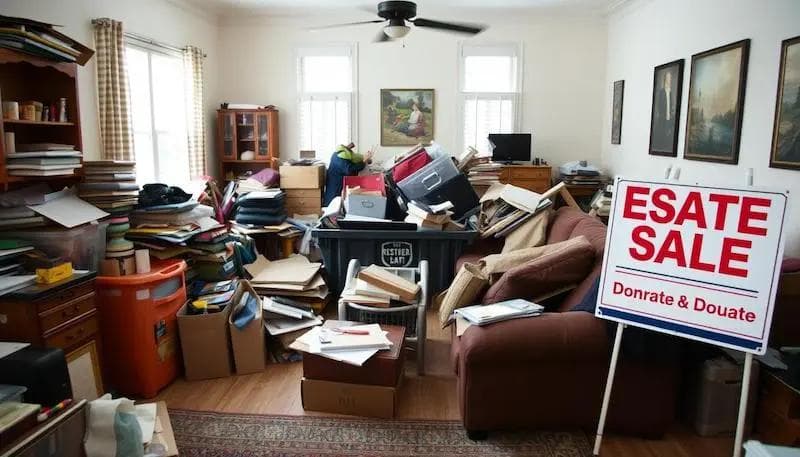
Dealing with a loved one's personal property after they pass away can feel overwhelming. You have several choices for handling these items, each with its own benefits.
Keep What You Need and Can Use
One option is to keep sentimental or useful items. This lets you preserve memories and find new uses for them. For items you can't keep, donating to charity is a meaningful way to honor your loved one's legacy.
Estate Sale
Selling through an estate sale or online platforms can help manage valuable possessions. This is a good choice for antiques or collectibles. Recycling is best for items that can't be sold or donated.
Flow For Sorting When You Remove Items From the Estate
- Keep: Preserve cherished memories
- Donate: Support charitable causes
- Sell: Generate funds from valuable items
- Recycle: Responsibly dispose of unusable items
- Discard: Remove items beyond repair or use
Remember, there's no rush to make decisions. Take time to process your emotions before sorting through possessions. Involve family members in the process to share memories and divide items fairly.
"Grief is individual to each person; what feels right for one might not be suitable for another, and that's perfectly acceptable."
Start with less sentimental areas of the house. This approach eases you into the process. Consider professional help for valuable or unique items to ensure proper handling.
Selling the House? Consider Selling With Everything You Don't Want
If you are an executor or estate administrator you can sell the house with court approval.
You can sell the house as-is, even with all of the contents from the deceased person. Typically, you will be selling to a cash home buyer. Investors that buy houses that require repairs or big clean outs can move fast and make this difficult time in your life a little easier. This is especially useful if you will be selling a hoarder house. They can clear a house and handle the donating and disposal of belongings of the deceased. This saves the executor a lot of time and trouble.
The goal is to honor your loved one's memory while managing their personal property responsibly. Choose options that bring comfort and align with your family's wishes.
Can you empty a house before probate?
Before getting started, you might want to know if it's ok if you start removing items before probate. Do you need to even go through probate? Will the probate court allow the cleaning out of the house now?
Let's cover these important bases.
According to Sean J Nichols, a probate attorney, "Before you empty the house and dispose of its contents, you need to determine whether the property is included in the probate process. If the house is included in the probating of an estate, you may not be able to take anything out of it until the probate process is complete. The personal representative or executor of the estate must take inventory of all the assets, including the contents of the house.
You might even consider selling the house while still in probate.
According to Brandon Haubert, at wh.law, "The great news is that there are circumstances in which executors can sell property without probate, such as when the property is jointly owned with rights of survivorship or has been transferred to a living trust. This can be particularly helpful in cases where mortgage payments or other expenses need to be addressed quickly. Selling property without probate successfully requires understanding local laws and regulations, assembling the necessary paperwork, and seeking assistance from professionals."
So, you may not need to wait until probate is complete, just that an inventory and assessment has been made.
There are some cases where a small estate can even use an affidavit of heirship.
Understanding the Emotional Process of Clearing a Loved One's Home
Clearing a loved one's home after they pass away is tough. It mixes complex feelings with practical tasks. Many feel overwhelmed, as it brings up strong feelings of loss and grief.
Recognizing the Challenges of Grief and Decluttering
Sorting through personal items can be hard. You might feel overwhelmed or devastated by clothes, photos, and other items that hold memories. These feelings are normal when dealing with loss.
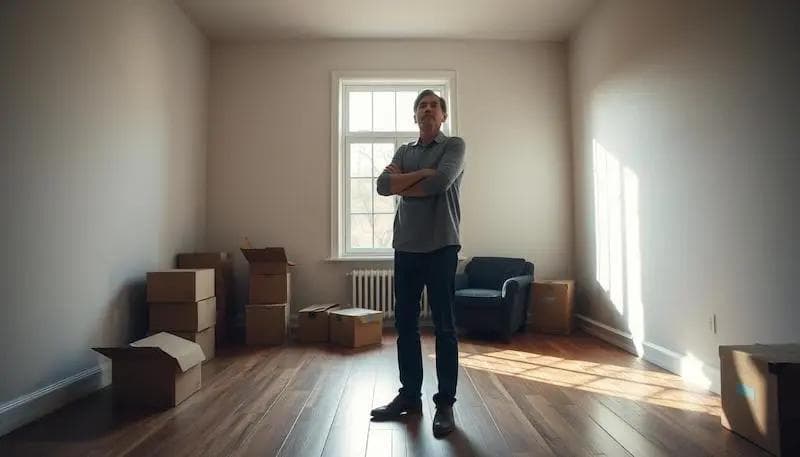
Taking Time to Process Emotions Before Starting
It's important to take time to feel your emotions before starting to clear out the home. Rushing can lead to regret. Using a plan like the Pile Plan helps sort items into keep, let go, and undecided piles.
Creating a Support System for the Task
Having support is key for emotional and practical help. Include family or friends in sorting items. They offer comfort and help with making decisions. It's okay to take breaks and get professional help if needed.
This message from Empathy.com rings true, "You can and should seek help in the form of family members who collaborate with you and take over items from the estate to-do list, as well as professionals whose expert knowledge helps you handle thornier issues.
But in the end, it can be a lonely job because there can only be one executor or administrator. You may have help, but you are solely responsible for meeting deadlines and managing the estate.
It is easy to feel like you’ll never get it all done, it will never be over, and no one appreciates what you’re doing. At the same time, grief and sadness can leave you feeling depleted and unmotivated."
Understanding the emotional challenges and building a supportive network helps you get through this tough task. It honors your loved one's memory and looks after your mental health.
Removing Items from House After Death: A Step-by-Step Approach
Dealing with the belongings of a loved one after they pass away can feel like a huge task. Breaking it down into smaller steps can make it easier. Here's a step-by-step guide to help you sort through items while keeping your feelings in check.
Step 1: Starting with Less Sentimental Areas
Start by decluttering areas that don't hold much emotional value, like the bathroom or kitchen. This makes it easier to get started and builds your confidence. About 70% of people find it helpful to have someone by their side during this time, so don't be afraid to ask for support.
Sorting Items into Categories
Sort items into four main groups: keep, donate, sell, and discard. This makes deciding what to do with each item simpler and less overwhelming. If there's a will, it might outline how to distribute personal belongings.
Handling Sentimental Items with Care
Be gentle when dealing with items that hold a lot of emotional value. These items are precious for a reason. Think about ways to keep the memories alive without keeping everything, like taking photos or turning items into new keepsakes.
Seeking Professional Help for Valuables
If you have unique or valuable items, getting a professional appraisal is key. Experts can give you an accurate idea of what these items are worth. This is important because the total value of an estate includes all the possessions, known as 'chattels' in legal terms.
"Clearing a loved one's home is a journey of memories and decisions. Take it one step at a time, and don't be afraid to seek help when needed."
On average, cleaning out a house takes about three weeks. Be kind to yourself and the process. If feelings make it hard, think about getting professional help with estate management.
Leave Items There and Sell As Is to a Cash Home Buyer
Dealing with a loved one's belongings after they are deceased can be a depressing proposition. Selling the house as-is to cash home buyers might be a good option for you. This way, you can sell the home quickly without having to go through all the items.
Real estate investors often buy properties in their current state, including everything inside. This might mean you get less money for the sale. But, it can make things easier during a hard time. Here are some good things about selling your property as-is:
- Avoid the emotional stress of sorting through belongings
- Don't waste time cleaning and decluttering
- Get around probate delays, which can take months or even years
- Get a cash offer within 24 hours in some cases
Cash home buyers can buy the property in as little as 10 days. This makes the process easy and stress-free. It's a great choice if you're dealing with disagreements over the inheritance or if you live far away. This can also help relieve the stress when you don't know who will pay the mortgage after death.
"Selling to a cash buyer provided the quick solution we needed during a difficult time. We didn't have to worry about cleaning out the house or making repairs." - Gary V., San Antonio, TX
Even though cash buyers offer ease, make sure to look for reputable investors for a fair deal. It's a good idea to talk to a real estate expert who knows about selling inherited properties. They can help you through the process.
Conclusion
Dealing with a loved one's death means going through a tough process of sorting out their belongings. This journey can take six to nine months or even longer. It's filled with legal and emotional hurdles.
Deciding how to handle their items is a big step. You might sort them out yourself, get professional help, or sell everything as-is. Remember, the goal is to keep their memory alive while tackling the practical stuff. Experts like estate liquidators and appraisers can help figure out the value of items.
When you're ready, you might organize an estate sale, donate items, or share them with family. Services like Neighbor offer cheap storage solutions across the country, which can be a big help. Remember, there's no one "right" way to deal with this. The most important thing is to be patient, understanding, and supported. Give yourself time to heal and celebrate your loved one's life.
If you would like to get a no-obligation cash offer from a house buying company, give us a call. Danny Buys Houses is a cash home buyer based in San Antonio, TX. We would be happy to help you in any way we can.

AUTHOR
Danny Johnson
Owner and Founder at Danny Buys Houses
Danny Johnson is an experienced real estate investor who has been buying houses for cash since 2003. As owner of Danny Buys Houses, Danny's goal is to help homeowners sell their house fast, regardless of the situation, so they can move on with their life.
Danny has been featured in publications such as Forbes, Realtor.com, BiggerPockets, Yahoo Finance, US News, and more. He is also the author of the book 'Flipping Houses Exposed'.


